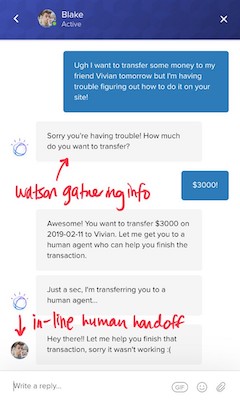 To kickoff this week’s Think 2019 event in San Francisco, IBM hosted an on-stage, live debate between its AI-powered machine, Project Debater, versus 2016 World Debating Championship finalist, Harish Natarajan, a human being. The subject under debate was whether the government should subsidize preschools. After each had made their arguments, the audience voted (myself included) and the human won. But in a panel session afterwards, champion debater Natarajan noted, “what really struck me is the potential value of IBM Debater when [combined] with a human being.”
To kickoff this week’s Think 2019 event in San Francisco, IBM hosted an on-stage, live debate between its AI-powered machine, Project Debater, versus 2016 World Debating Championship finalist, Harish Natarajan, a human being. The subject under debate was whether the government should subsidize preschools. After each had made their arguments, the audience voted (myself included) and the human won. But in a panel session afterwards, champion debater Natarajan noted, “what really struck me is the potential value of IBM Debater when [combined] with a human being.”
In that vein, Think 2019 showcased a slew of sessions and topics delving into real-world opportunities of humans and machines working together, namely with IBM’s Watson Assistant. Watson Assistant helps companies manage a wide range of customer and employee service inquiries with out-of-the-box tools to build intents and entities in order to automate natural-language customer interactions with cloud-based conversation management and routing services.
This week, IBM introduced a fully managed service desk integration with Intercom, a customer messaging platform. Intercom now has the ability to include a virtual Watson Assistant to handle and triage conversations. Available to IBM customers, the Intercom client-facing application can automatically interact and assign inbound conversations to human agents. Watson acts as an initial handler for new customer conversations, trained to handle and respond when the intent confidence is above 75%. Additionally, the intelligent assistant can handle “digressions” during a flow to route to a live agent if the customer is frustrated and needs direct communication.
IBM also announced this week an integration with IBM Cloud Private for Data where Watson Assistant can be run on multiple environments, including on premises or any private, public, or hybrid cloud. This “Watson Anywhere” initiative should drive further efforts in deploying enterprise intelligent assistance, and is a great example of new strategies to easily integrate chatbots and virtual assistants with APIs and connecting architecture to CRM systems or additional channels.
Also showcased at #Think2019 were a number of Watson Assistant deployments including:
- Royal Bank of Scotland (RBS) – Deployed a virtual assistant named Cora, trained with over 1,000 responses to more than 200 customer queries. RBS has claimed to achieve 40% call deflection, while creating new employee roles for human agents as “conversational analysts.”
- TD Bank – Canadian bank created an online chatbot for TD branches with the goal to deflect upwards of 40%-60% of branch inquiries. (Still in pilot phase)
- Mercedes-Benz Financial Services: Through a rapid production cycle including a “chatbot-a-thon,” the design team here developed a prototype for its virtual assistant in one week. Launched in October 2018, “Mercedes” is a multi-channel virtual assistant for customer self-service with 10K customer interactions in the first month, while achieving high levels of accuracy and customer satisfaction feedback (3.5 out of 4).
IBM also names Bradesco (second largest bank in Brazil), 24 ORE Group, Nationwide Building Society and others as Watson Assistant customers. It’s clear that IBM is gaining traction in the world of enterprise intelligent assistants and with “Watson Anywhere,” who knows where next we’ll see humans and AI-powered machines working together.
Categories: Conversational Intelligence, Intelligent Assistants, Articles

 2025 Conversational AI Intelliview: Decision-Makers Guide to Self-Service & Enterprise Intelligent Assistants
2025 Conversational AI Intelliview: Decision-Makers Guide to Self-Service & Enterprise Intelligent Assistants  Talk to the Web: How NLWeb Opens Conversational Access to Site Content
Talk to the Web: How NLWeb Opens Conversational Access to Site Content  Voice AI Agents Redefine CX: Trends, ROI, and Strategies for 2025
Voice AI Agents Redefine CX: Trends, ROI, and Strategies for 2025  Why Voice AI Is Foundational for Enterprise Innovation (Webinar)
Why Voice AI Is Foundational for Enterprise Innovation (Webinar)